I have powershell script to insert values from an xml file into the sql database.
The issue I'm facing is that i cant seem to insert the values into the sql database, as the error states that the string value in data source is not getting converted to the uniqueidentifier type in target columns(which are basically the ScheduleId and AccountingPeriodCase_PK_ID columns in the sql database).
I tried changing the [guid] datatype during columns.add() to [uniqueidentifier] and all but they gave me errors.
Script:
$dataSource = $env:COMPUTERNAME;
$database = "DataModel.PAModel"
$connection = New-Object System.Data.SqlClient.SqlConnection; #setting connection
$connection.ConnectionString = "Server=$dataSource;Database=$database;Integrated Security=True;";
$connection.Open();
$command = New-Object System.Data.SqlClient.SqlCommand;
$command.Connection = $connection;
$as = New-Object System.Data.SqlClient.SqlDataAdapter;
$as.SelectCommand = $command;
$filename = "C:\XML\apc.xml"; #file to be loaded into sql server database table
$ds = New-Object System.Data.DataSet;
$ds.ReadXml($filename); #reading from the file -- line gives output InferSchema
$dt = New-Object System.Data.DataTable;
$dt.Columns.Add("StartTime",[datetime]);
$dt.Columns.Add("EndTime",[datetime]);
$dt.Columns.Add("Status",[int]);
$dt.Columns.Add("ProcessedTime",[datetime]);
$dt.Columns.Add("ScheduleId",[guid]);
$dt.Columns.Add("Model",[string]);
$dt.Columns.Add("ModelVersion",[string]);
$dt.Columns.Add("ModelVersionState",[string]);
$dt.Columns.Add("ModifiedTime",[datetime]);
$dt.Columns.Add("WriteBackLastRunTime",[datetime]);
$dt.Columns.Add("ModifiedBy",[string]);
$dt.Columns.Add("ModelType",[int]);
$dt.Columns.Add("IsTimeRange",[int]);
$dt.Columns.Add("WriteBackStatus",[int]);
$dt.Columns.Add("RetryWriteBack",[int]);
$dt.Columns.Add("NumOfRetry",[int]);
$dt.Columns.Add("FrequencyUnits",[int]);
$dt.Columns.Add("ScheduleType",[int]);
$dt.Columns.Add("CustomType",[int]);
#$dt.Columns.Add("ShiftStartTime",[datetime]);
#$dt.Columns.Add("StartWeekDay",[int]);
#$dt.Columns.Add("EndWeekDay",[int]);
$dt.Columns.Add("WritebackProcessedTime",[datetime]);
$dt.Columns.Add("DiagStatus",[int]);
$dc = New-Object System.Data.DataColumn;
$dc = $dt.Columns.Add("AccountingPeriodCase_PK_ID",[guid]);
$dc.AllowDBNull.Equals($false);
$dc.Unique.Equals($true);
$dt=$ds.Tables[0];
$bcp = New-Object "Data.SqlClient.SqlBulkCopy" $connection; #bulkcopy to the destination table.
$bcp.DestinationTableName = "dbo.AccountingPeriodCases";
#$bcp.ColumnMappings.Count;
$bcp.ColumnMappings.Clear();
$bcp.ColumnMappings.Add("StartTime","StartTime");
$bcp.ColumnMappings.Add("EndTime","EndTime");
$bcp.ColumnMappings.Add("Status","Status");
$bcp.ColumnMappings.Add("ProcessedTime","ProcessedTime");
$bcp.ColumnMappings.Add("ScheduleId","ScheduleId");
$bcp.ColumnMappings.Add("Model","Model");
$bcp.ColumnMappings.Add("ModelVersion","ModelVersion");
$bcp.ColumnMappings.Add("ModelVersionState","ModelVersionState");
$bcp.ColumnMappings.Add("ModifiedTime","ModifiedTime");
$bcp.ColumnMappings.Add("WriteBackLastRunTime","WriteBackLastRunTime");
$bcp.ColumnMappings.Add("ModifiedBy","ModifiedBy");
$bcp.ColumnMappings.Add("ModelType","ModelType");
$bcp.ColumnMappings.Add("IsTimeRange","IsTimeRange");
$bcp.ColumnMappings.Add("WriteBackStatus","WriteBackStatus");
$bcp.ColumnMappings.Add("RetryWriteBack","RetryWriteBack");
$bcp.ColumnMappings.Add("NumOfRetry","NumOfRetry");
$bcp.ColumnMappings.Add("FrequencyUnits","FrequencyUnits");
$bcp.ColumnMappings.Add("ScheduleType","ScheduleType");
$bcp.ColumnMappings.Add("CustomType","CustomType");
#$bcp.ColumnMappings.Add("ShiftStartTime","ShiftStartTime");
#$bcp.ColumnMappings.Add("StartWeekDay","StartWeekDay");
#$bcp.ColumnMappings.Add("EndWeekDay","EndWeekDay");
$bcp.ColumnMappings.Add("WritebackProcessedTime","WritebackProcessedTime");
$bcp.ColumnMappings.Add("DiagStatus","DiagStatus");
$bcp.ColumnMappings.Add("AccountingPeriodCase_PK_ID","AccountingPeriodCase_PK_ID");
#$bcp.ColumnMappings.Count;
if ($connection.State -ne [Data.ConnectionState]::Open) {
"Connection to DB is not open.";
Exit;
}
$bcp.WriteToServer($dt); #writing to server
$bcp.ColumnMappings.Clear();
$connection.Close();
Error:
Exception calling "WriteToServer" with "1" argument(s): "The given value of type String from the data source cannot be converted to type uniqueidentifier of the specified target column." At C:\Documents\DCT\SavedScripts\XMLtoDB\AccountingPeriodCases\xAccountingPeriodCases .ps1:96 char:1
+ $bcp.WriteToServer($dt); #writing to server
+ ~~~~~~~~~~~~~~~~~~~~~~~
+ CategoryInfo : NotSpecified: (:) [], MethodInvocationException
+ FullyQualifiedErrorId : InvalidOperationException
The sql database table have the following columns:

Could you help me resolve the error?
The values of ScheduleId and AccountingPeriodCases_PK_ID :
